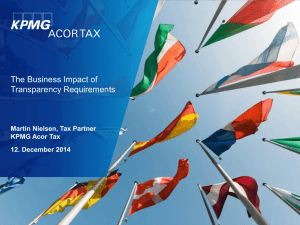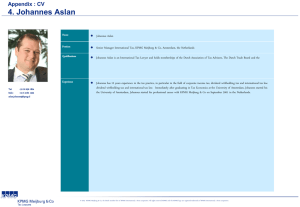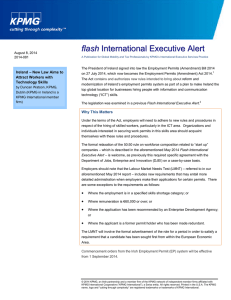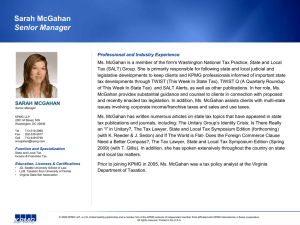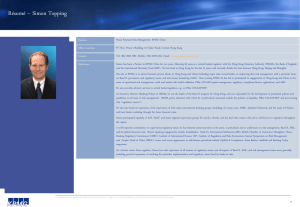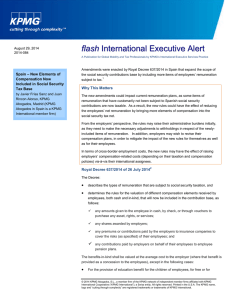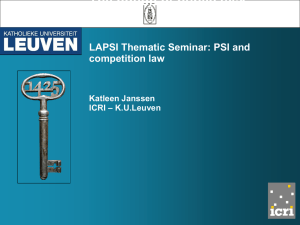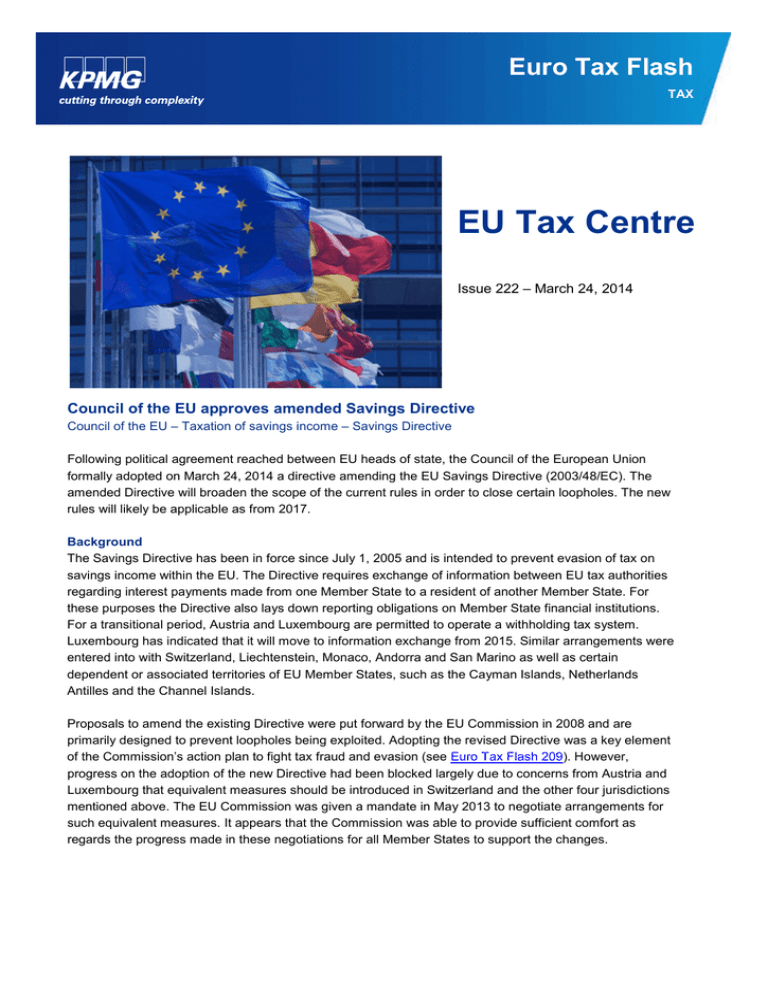
Euro Tax Flash
TAX
EU Tax Centre
Issue 222 – March 24, 2014
Council of the EU approves amended Savings Directive
Council of the EU – Taxation of savings income – Savings Directive
Following political agreement reached between EU heads of state, the Council of the European Union
formally adopted on March 24, 2014 a directive amending the EU Savings Directive (2003/48/EC). The
amended Directive will broaden the scope of the current rules in order to close certain loopholes. The new
rules will likely be applicable as from 2017.
Background
The Savings Directive has been in force since July 1, 2005 and is intended to prevent evasion of tax on
savings income within the EU. The Directive requires exchange of information between EU tax authorities
regarding interest payments made from one Member State to a resident of another Member State. For
these purposes the Directive also lays down reporting obligations on Member State financial institutions.
For a transitional period, Austria and Luxembourg are permitted to operate a withholding tax system.
Luxembourg has indicated that it will move to information exchange from 2015. Similar arrangements were
entered into with Switzerland, Liechtenstein, Monaco, Andorra and San Marino as well as certain
dependent or associated territories of EU Member States, such as the Cayman Islands, Netherlands
Antilles and the Channel Islands.
Proposals to amend the existing Directive were put forward by the EU Commission in 2008 and are
primarily designed to prevent loopholes being exploited. Adopting the revised Directive was a key element
of the Commission’s action plan to fight tax fraud and evasion (see Euro Tax Flash 209). However,
progress on the adoption of the new Directive had been blocked largely due to concerns from Austria and
Luxembourg that equivalent measures should be introduced in Switzerland and the other four jurisdictions
mentioned above. The EU Commission was given a mandate in May 2013 to negotiate arrangements for
such equivalent measures. It appears that the Commission was able to provide sufficient comfort as
regards the progress made in these negotiations for all Member States to support the changes.
Euro Tax Flash
TAX
Enlarged scope
The primary aim of the changes is to include all types of savings income and products that generate
interest or equivalent income. It would include life insurance contracts as well as a broader coverage of
investment funds. It also applies a “look through” approach to certain EU as well as non-EU interposed
entities or legal arrangements. The Directive should be seen in conjunction with the proposals to extend
the scope of the current EU Directive on Mutual Administrative Cooperation (2011/16/EU – see Euro Tax
Flash 215). EU Taxation Commissioner Semeta stated in a speech announcing its adoption, that the
revised Directive would be part of the EU’s legislative structure implementing the new global standard on
automatic information exchange put forward by the OECD, with which the new Directive is “fully
consistent”.
Timing
The Member States will have to have legislation in place to implement the new rules by January 1, 2016
and it is likely that these would be applied as from January 1, 2017. Semeta also indicated that he expects
to conclude negotiations with Switzerland before the end of the year.
EU Tax Centre Comment
The adoption of the revised Savings Directive should be seen in the context of the global pressure to
adopt measures to prevent tax evasion, in particular the US FATCA initiative and the related OECD
common reporting standard.
Should you require further assistance in this matter, please contact the EU Tax Centre or, as appropriate,
your local KPMG tax advisor.
Robert van der Jagt
Chairman, KPMG’s EU Tax Centre and Partner, KPMG Meijburg & Co
vanderjagt.robert@kpmg.nl
Barry Larking
Director, EU Tax Services, KPMG’s EU Tax Centre
larking.barry@kpmg.nl
www.kpmg.com/eutax
Euro Tax Flash is published by KPMG International Cooperative in
collaboration with the EU Tax Centre. Its content should be viewed
only as a general guide and should not be relied on without
consulting your local KPMG tax adviser for the specific application
of a country's tax rules to your own situation. The information
contained herein is of a general nature and is not intended to
address the circumstances of any particular individual or entity.
Although we endeavor to provide accurate and timely information,
there can be no guarantee that such information is accurate as of
the date it is received or that it will continue to be accurate in the
future. No one should act on such information without appropriate
professional advice after a thorough examination of the particular
situation.
© 2014 KPMG International Cooperative (“KPMG International”),
a Swiss entity. Member firms of the KPMG network of
independent firms are affiliated with KPMG International. KPMG
International provides no client services. No member firm has any
authority to obligate or bind KPMG International or any other
member firm vis-à-vis third parties, nor does KPMG International
have any such authority to obligate or bind any member firm. All
rights reserved.
The KPMG name, logo and “cutting through complexity” are
registered trademarks or trademarks of KPMG International.

